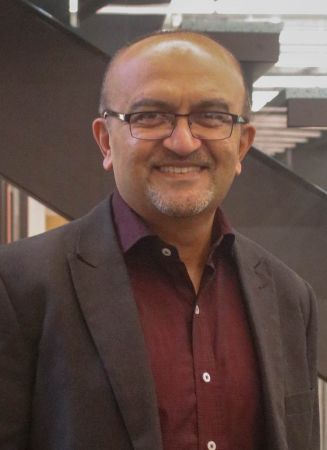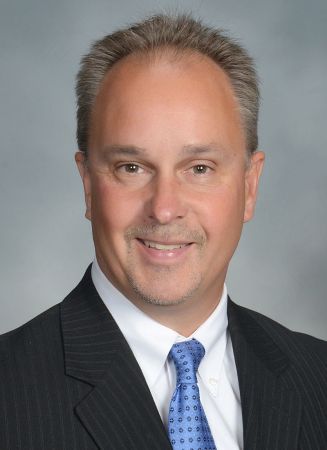Mayuresh V. Kothare, Lehigh University’s R. L. McCann Professor of Chemical and Biomolecular Engineering (ChBE), has been named associate dean for research in the P.C. Rossin College of Engineering and Applied Science.
The appointment follows the movement of John P. Coulter, senior associate dean for research and a professor of mechanical engineering and mechanics, to the new position of associate vice provost for research translation within Lehigh’s Office of the Provost and Senior Vice President for Academic Affairs, as announced by the university October 30 in an email to faculty and staff. Coulter has served as the college’s chief research officer since 2002.
“The significance of John’s leadership over the past quarter century in the Rossin College, and its research agenda more specifically, cannot be overstated,” says Dean Stephen P. DeWeerth. “We look forward to working with John in his new endeavor, and we are equally thrilled that Mayuresh, an impressive researcher and dedicated professor will be leading the way forward.”
In his new role, Coulter will lead the development of an ecosystem for long-term enhancement of research translation at Lehigh. This includes building on his role as PI for the National Science Foundation (NSF)-funded Accelerating Research Translation award. He will also collaborate closely with the Office of the Vice Provost for Research and the Vice Provost for Entrepreneurship to ensure that the full range of research translation pathways are recognized and supported at Lehigh, including start-up ventures, translation to existing industry, and those that are focused on direct societal impact.
Kothare, who was recently elected a Fellow of the American Association for the Advancement of Science (AAAS), works on the development and application of advanced control systems to optimize processes in the fields of biomedical engineering, including treating disease through neurostimulation, and energy, such as optimizing and controlling energy-intensive industrial processes.
He joined the Lehigh faculty in 1998 and served as chair of the ChBE department from 2012-2021. During that period, he led the initiative to integrate the biomolecular component into the department’s official name, refocused the department’s research thrusts, hired six tenured/tenure-track faculty members, and established the William E. Schiesser faculty fellowship and the John C. Chen graduate fellowship. During his term as department chair, the faculty demographics shifted substantially with the department moving from zero to three female faculty members. Three new distinguished seminar series were established under his leadership—the John C. Chen, Arthur Humphrey, and Costel Denson series, with the Denson series being named to recognize the diversity in the chemical engineering research community, in honor of Dr. Costel Denson, the first African American student to have attended Lehigh.
“Academic research in engineering is the cornerstone of innovation and progress, driving the development of new technologies, enhancing existing systems, and solving complex problems,” says Kothare. “Investing in strategic interdisciplinary research is a key to our university’s institutional strategy, Inspiring the Future Makers, and I look forward to working with the leadership team to accelerate our progress. I thank John Coulter for setting the stage for the college to embark on our next steps in advancing our research footprint.”
About Mayuresh Kothare
Kothare’s cross-disciplinary work involves constrained and optimal predictive control theory, closed-loop robustness analysis, modeling and machine learning control of chemical, biomedical and neuro engineered systems. His research has been supported through grants from NSF, NIH, DOE, the Commonwealth of Pennsylvania, and various industries. His research has led to six US patents, including the licensing/options agreement of three of these patents with two start-up companies—Pharmateck LLC (US) and Omni Life (India).
He is a Fellow of the Institute of Electrical and Electronics Engineers (IEEE) and American Institute of Chemical Engineers (AIChE), as well as a recipient of the prestigious NSF CAREER award. In 2023, he won the High Impact Paper Award given by the International Federation of Automatic Control (IFAC), and was honored with the Distinguished Alumnus Award from the Indian Institute of Technology, Bombay in 2020. Other recognitions include the AIChE CAST Division Outstanding Young Investigator Award and the AIChE CAST Division Ted Peterson Publication Award; he was also an invited participant at the 2008 Frontiers of Engineering Workshop of the US National Academy of Engineering. At Lehigh, he has been recognized with the Alfred Noble Robinson Award, the P.C. Rossin Assistant Professorship, and the Frank Hook Assistant Professorship.
Kothare is chair of the AIChE Publication Committee. He has served as associate editor for the journals Automatica, IEEE Transactions on Automatic Control, and IEEE Transactions on Systems, Man, Cybernetics: Systems; guest editor for the Journal of Process Control; and deputy editor-in-chief of IFAC PapersOnLine. He was past Chair of the AIChE CAST division. He is currently serving as special issue editor for several participating Frontiers journals on the topic of vagal nerve stimulation and organ specific modeling of therapeutic response. His research has garnered nearly 11,000 citations, highlighting his status as a leading expert in his field.
His former graduate (PhD) students hold leading positions in industry and academia in the US and abroad: Dr. Khaled Al-Fadhel has been Director General of the Kuwait Foundation for the Advancement of Science and Chairman of the Kuwait Petroleum Corporation (representing Kuwait in OPEC). Dr. Leonidas Bleris is the Cecil H. and Ida Green Chair in Systems Biology at UT Dallas. Dr. Leyla Ozkan is on the faculty of Electrical Engineering at Eindhoven University. Dr. Ashish Pattekar was Engineering Manager of Hardware at Apple and now holds the position of Hardware Manager at Amazon Lab126.
Kothare currently supervises four doctoral students, one postdoctoral scholar, and four undergraduate researchers.


